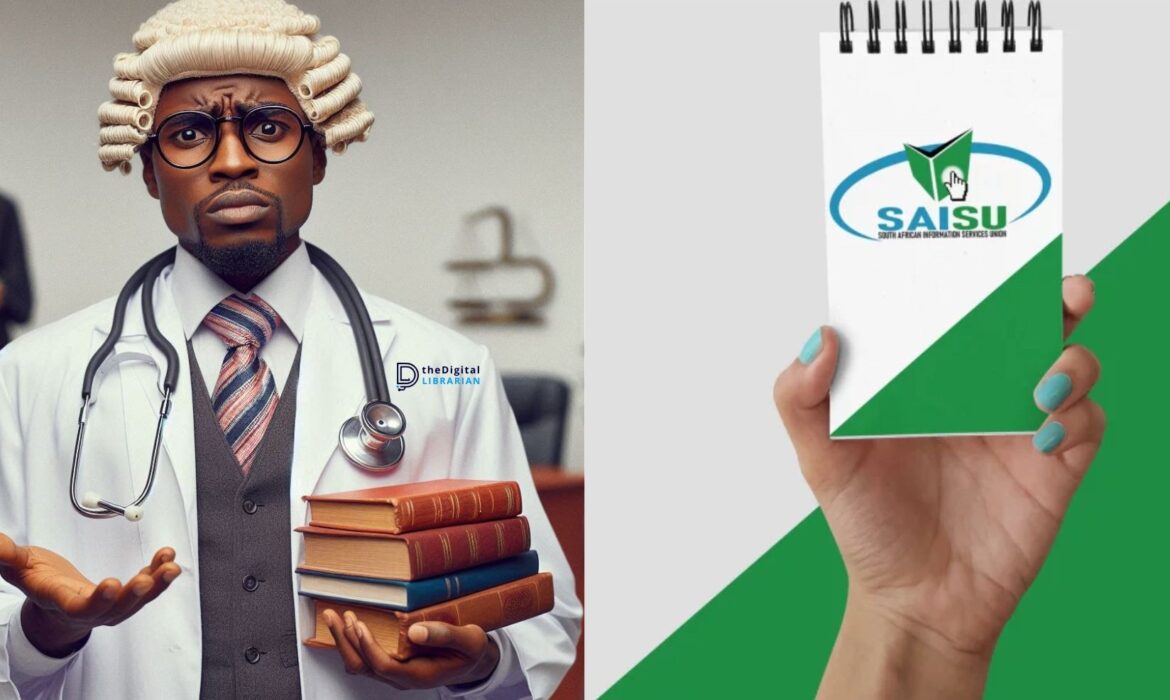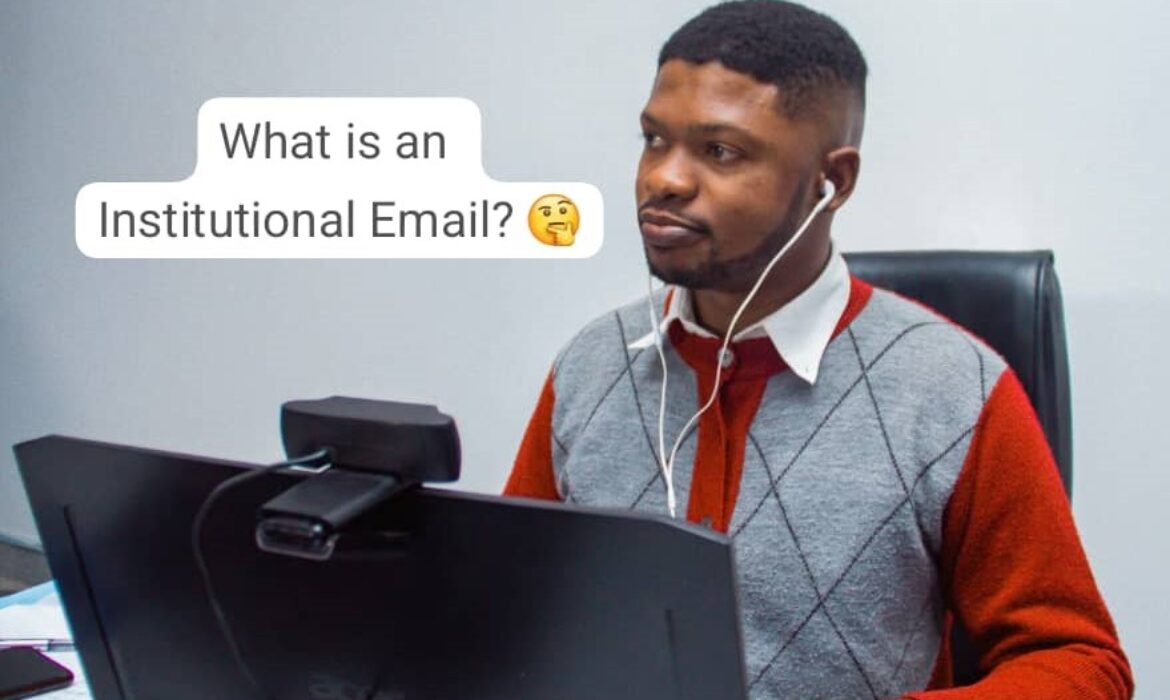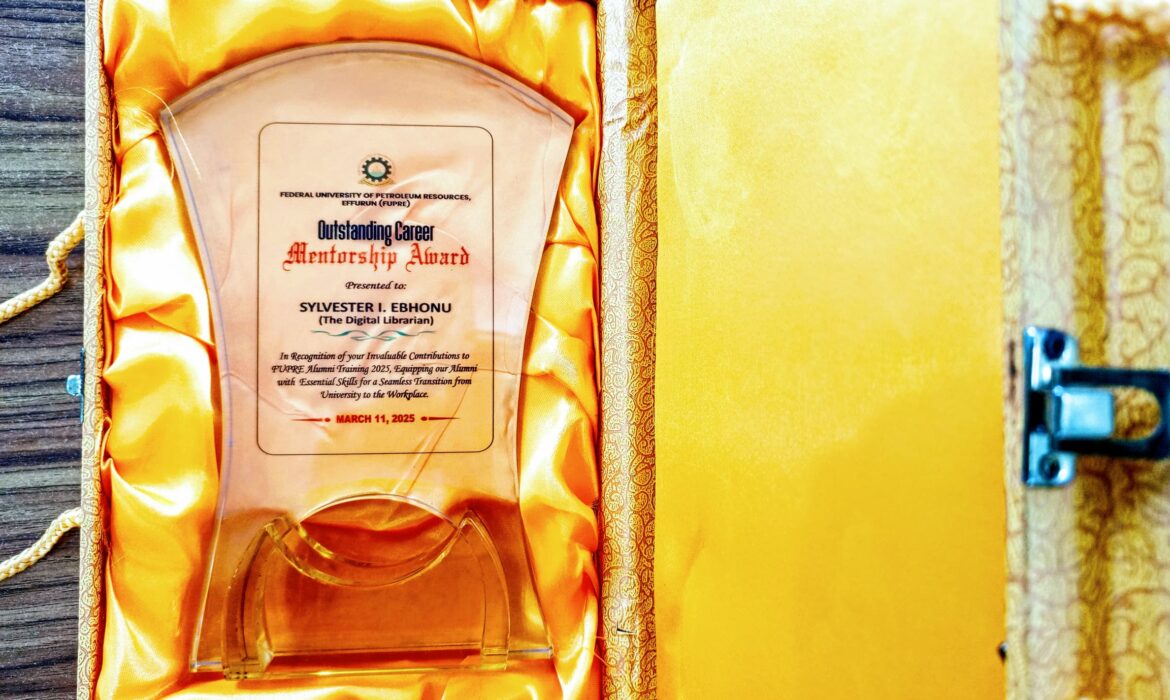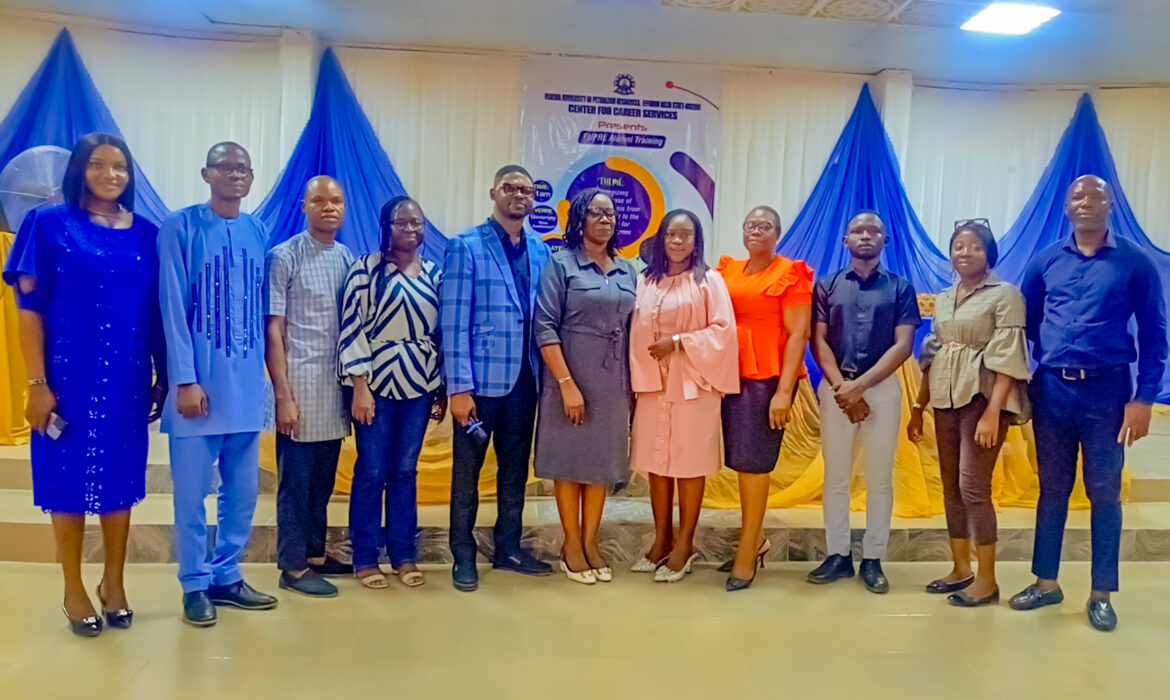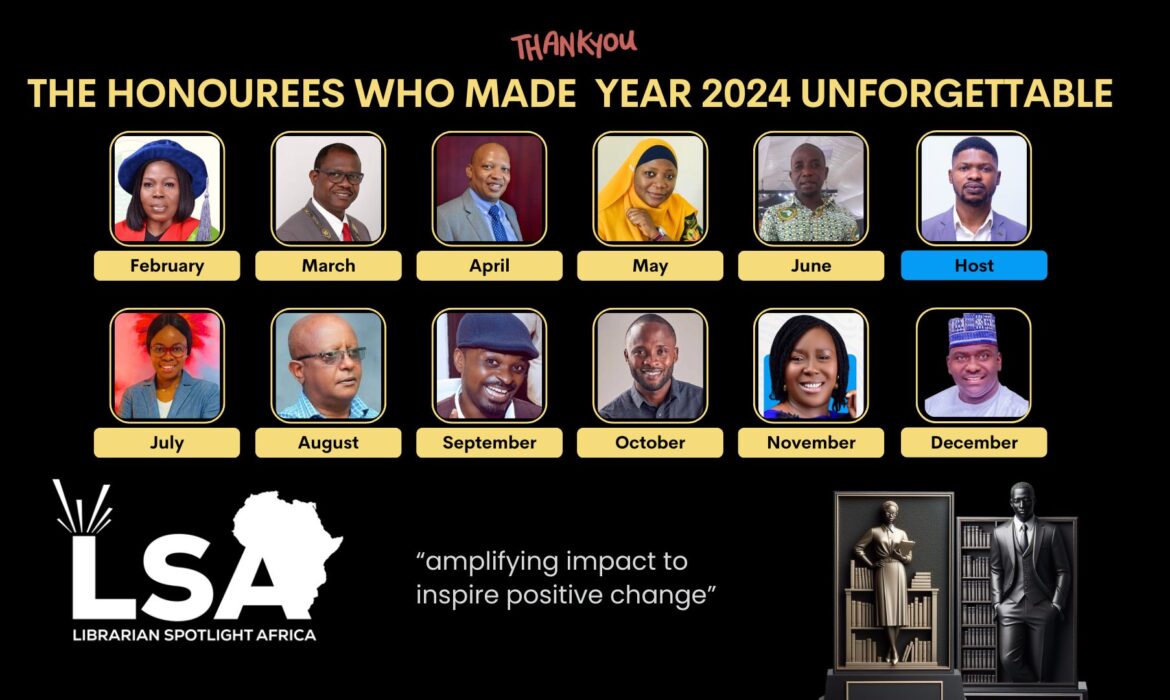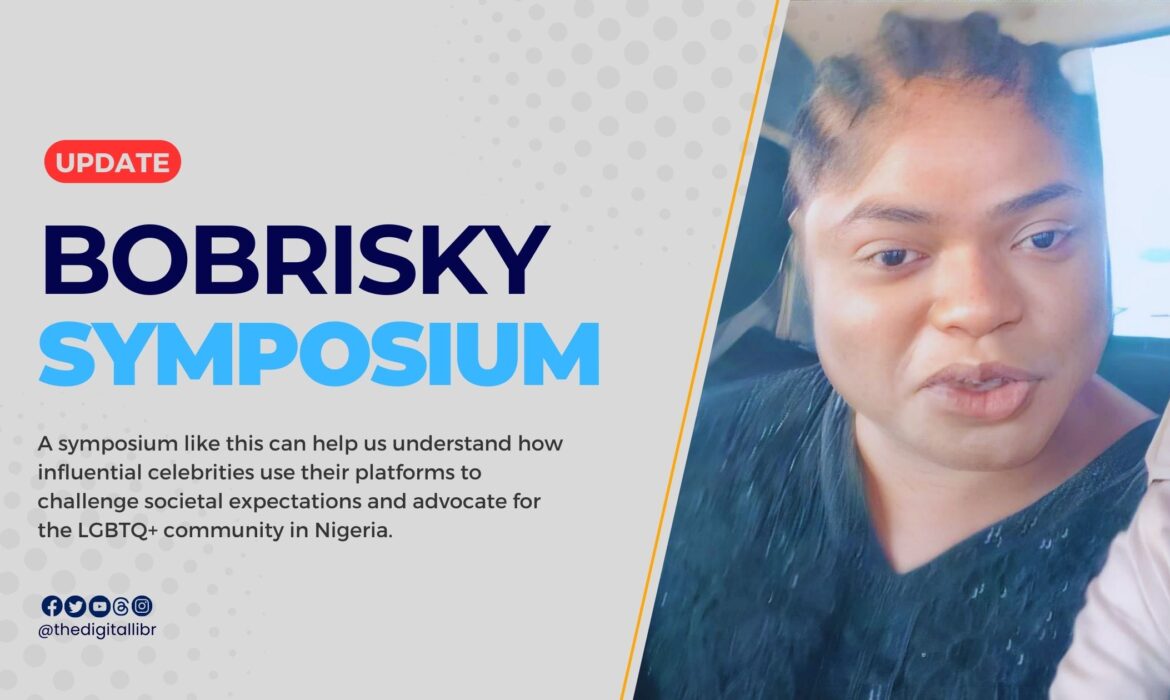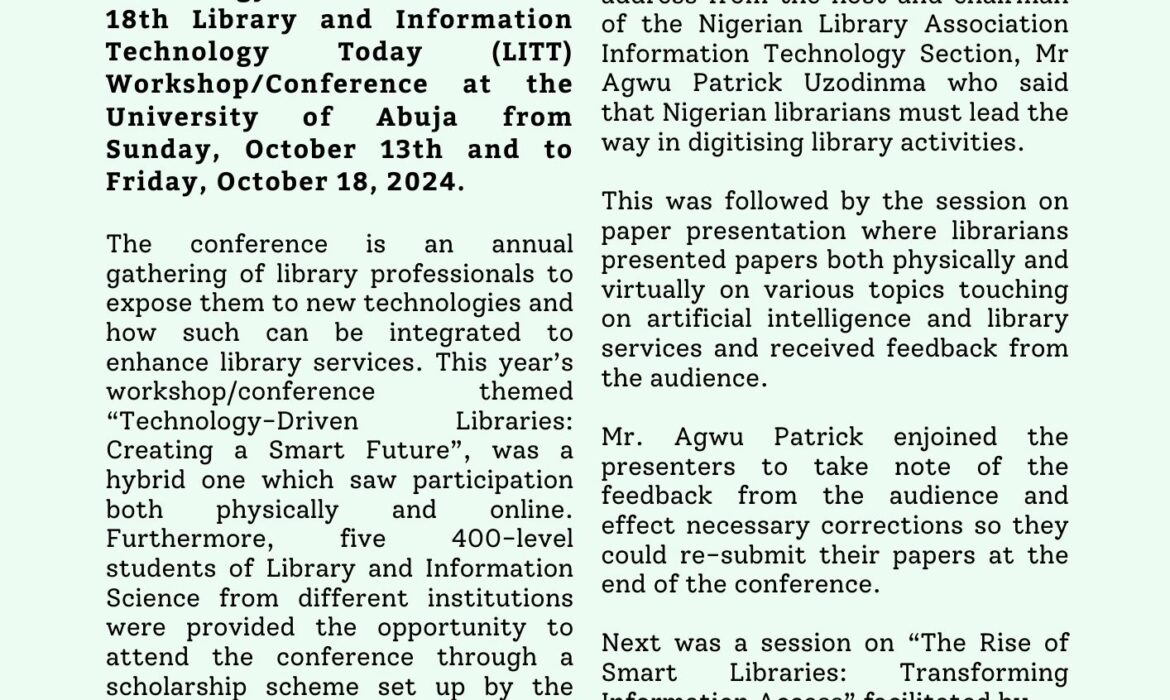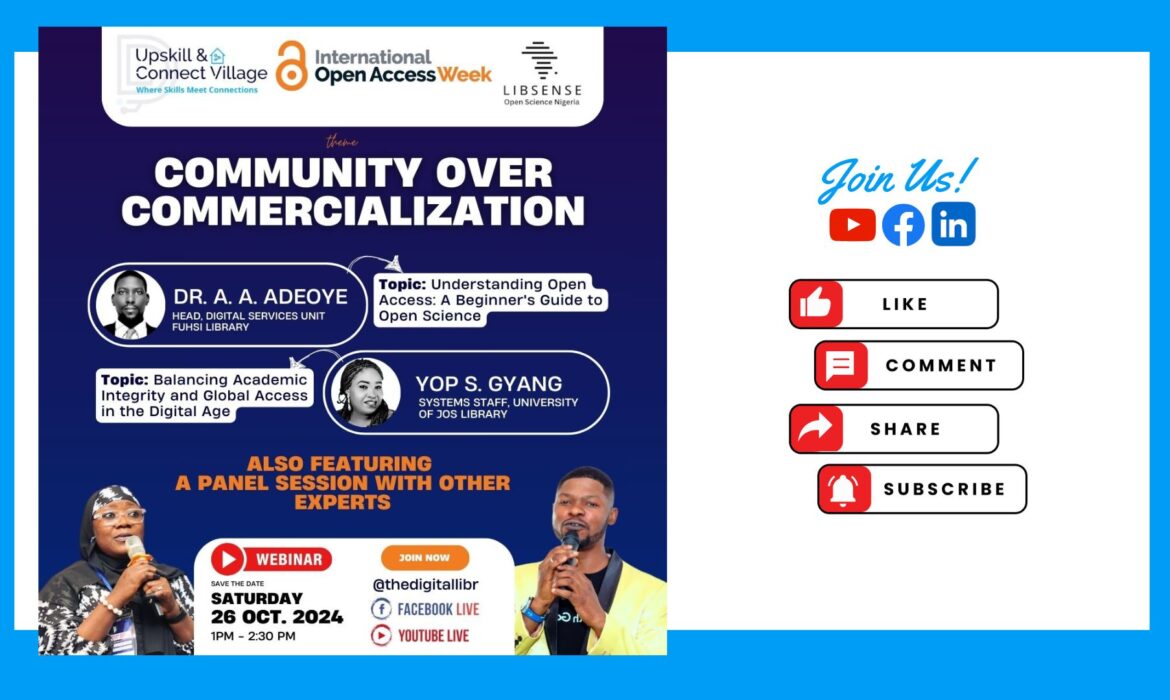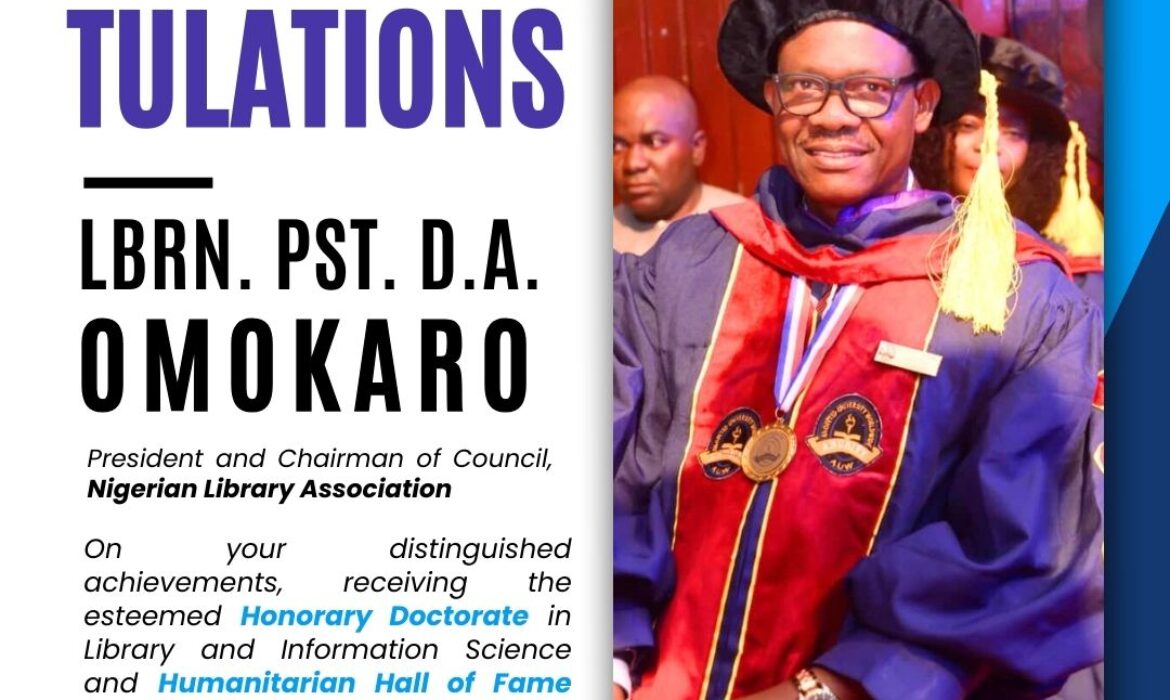This Shouldn’t be Happening at the National Library of South Africa
I just read about the unfolding situation at the National Library of South Africa (NLSA), and I’m very concerned about it. The leadership position of the NLSA (National Librarian/CEO) was recently re-advertised. But this time, the title “National Librarian” was quietly dropped, and Library and Information Science (LIS) qualifications have been downgraded from a requirement to just a “preference” according to a petition championed by Lesetsa Sanele
But, how can a National Library be headed by someone who is not even a librarian? Is this not a huge blow to the integrity of the LIS profession? Honestly, the role of who heads a National Library is too strategic to be treated like any another administrative job. Imagine appointing a Doctor as a President of an association of Lawyers? Through conversations on the Librarian Spotlight Africa (LSA) platform, we’ve seen this kind of thing happen in other countries too, including here in Nigeria. And every time, actions like these just weakens the system. Our Libraries deserve better!
This isn’t just a South African issue, it affects all of us who care about the future of libraries, access to information, and preservation of Africa’s heritage. In the interest of transparency and accountability, the petitioners are urging the NLSA Board to take immediate action to address these concerns.
1. Immediate public release of the names, qualifications, and professional backgrounds of all current NLSA Board members.
2. A firm commitment that the future leadership of the NLSA, specifically the National Librarian/CEO, will be selected based on professional LIS standards.
3. A complete stop to the appointment of the National Librarian who is not a librarian
Interestingly, this is not the first time an action is taking to discourage such moves. On 17th of March 2025, the Library and Information Association of South Africa (LIASA) raised the alarm in a post on their official Facebook page, reminding everyone that “we’re seeing a repeat of what happened in 2019”when the NLSA Board also attempted to appoint a non-librarian to lead the National Library.
If we’re going to build strong knowledge institutions in Africa, then we need the right people in the right positions.
So I’m lending my voice by signing this petition, and I’m encouraging you to do the same. As of today, 12th April, 2025, over 800 people have already signed, and we need to push it to 1,000 and even beyond. Librarians leading libraries. Period. Sign the Petition here:
Sylvester I. Ebhonu, CLN, amPAIDeF
Youtube Channel @ https://youtube.com/@thedigitallibr
#StandWithNLSA #LibraryLeadership #AfricanLibraries #LSA
WHY PROFESSIONAL EMAIL IS INTEGRAL TO INSTITUTIONAL IDENTITY?
An average email user today will tell you they prefer a Gmail to a Yahoo mail, and the reason is not far fetched. 80% of Entrepreneurs prefer Gmail to Yahoo mail. Signing up for a Gmail Account gives you access to a wide variety of Google products and services that can be of help, regardless of the kind of business you do. But as an institution or a company, have you considered the implication of not having a professional email address? Do you know there are implications for letting your staff use their personal email for official communications? A personal Gmail or Yahoomail address is different from a professional email address.
Every business that takes branding or its professional identity serious ensures that official email service forms an integral part of their institution or organization’s identity. Whether it’s an academic institution or corporate organization or SMEs, the importance of maintaining a professional and branded email system cannot be overemphasized. Many organisations, and a few institutions today, seem to overlook this important aspect of their digital identity, falling back to personal email accounts for professional correspondence. This oversight can lead to security risks, missed opportunities and reduce the credibility of such organizations and institutions. This ‘looong’ blog post therefore seeks to explore some of the benefits of professional email services and how they contribute to the identity and functionality of an organization, whether its educational or business.
WHAT IS A PROFESSIONAL EMAIL?
According to Zoho Mail, “A Professional email address is the email address you use primarily for your work related communication.” Ther email address usually include the name of the company or institution you work for. So for example, instead of using a free service like Gmail or Yahoo (e.g., amaka.okon@gmail.com), an organization or institution might issue their employees or students with an email address that ends with the institution’s domain name, for instance amaka.okon@adun.edu.ng, in some other cases we see something like library@adun.edu.ng (that’s if it is intended to serve a department like a Library or Registry, etc).
So, why is this worth learning about? Ideally, professional email (custom domain), which in this article can be used to represent institutional/organizational/official or business email helps to give an impression of trustworthiness in your communications. It plays a major role on how your institution is perceived. No doubt, Gmail and Yahoo provide free services, but they don’t give the impression of professionalism especially in the academic system. I could use my personal Gmail address for my personal communication with family and friends, but when communicating on behalf of my institution or organization with a Vendor, or a Researcher in a collaborative project, or an editor of a journal, it raises some questions about reliability and security. While an Institution cannot have administrative control over personal emails of employees or students, professional email services come with these features, hence they are recommended and used widely for institutional/organizational communications.
WHY SHOULD ORGANISATIONS/INSTITUTIONS CARE ABOUT PROFESSIONAL EMAIL?
In an ideal situation, your institution or organisation’s email would be the first point of contact with stakeholders and all those you wish to have any transaction or collaboration with. It could be a Prof. emailing his project student, or a researcher submitting an article to an international journal, or perhaps applying for a grant. Truth is, you don’t want to give a wrong first impression that you are not a legitimate member of staff or student of that institution, especially when dealing with external bodies. This is why institutions and organizations need to ensure they not only provide professional email for their communities, but also ensure the system is sustainable. Here are some specific reasons why you should care about Professional Email as an Entrepreneur, Academic or Administrator:
- For Security: Many organisations today face the risk of email security. With increase in phishing attacks and data breaches, using secured platforms like Google Workspace or Zoho for example, can help institutions safeguard communication and protect emails with encryption and other safeguarding features that can prevent unauthorized access.
- For Branding and Email Customization: Email service providers usually allow subscribers to customize their email signatures, programme auto-responders and a variety of other custom features which can help in enforcing an organisation’s brand identity.
- Professionalism and Trust: Think about this for a moment. If you receive an email from renoomoraka@yahoo.com, and another email from reno.omoraka@hisinstitutionname.com, don’t you think they both will convey different impression about professionalism? Receiving an email with your institution’s domain name gives people no reason to doubt, the recipient immediately builds trust.
- Collaboration and Efficiency: Many of these professional/Institutional email service providers offer a suite of productivity tools that help institutions or business streamline their communication and collaboration. Some of those features, depending on the platform (e.g. Google, Zoho, etc) features calendars, task management tools, Virtual meetings, project management tools, file sharing features, etc. All these features are needed especially in an academic setting where faculty, students, and staff must collaborate on various projects, from research to curriculum development. Gone are the days where students will have to print volumes of their project works repeatedly for correction, when all that can be achieved via email or a collaborative platform like Google.
flexible pooled storage per user that is shared across the organization.
- Administrative Control: With a company email address, you have control over the accounts. If an employee leaves, you can ensure business continuity by redirecting their emails or reassigning the email address.
The following are other benefits of a Professional Email Service as recommended by Zoho, (an Indian multinational technology company that makes computer software and web-based business tools, popularly known for their mail service, as well as Office Suite):
- Branding
- Builds trust
- Authenticity
- Reliability
- Ease of recalling
- Better deliverability and reputation
I hope you’re not getting bored reading this already?
Having looked at the benefits, it’s also important to understand what’s at stake when institutions neglect to adopt a professional email system.
WHAT IS AN INSTITUTION/ORGANISATION RISKING WITHOUT OFFICIAL EMAIL SERVICE?
The risks of not using a professional email service will not be over-emphasized in this article. So, let’s just explore these three:
- Risk of being Vulnerable to Security: In most sectors in the economy today, Email remains the main medium for communication, and this makes it a main target for cyber attacks. Who knows, could this be why some institutions in Nigeria prefer the use of memo, notices board and wasting a lot of print resources rather than leveraging digital? That’s a story for another day. The point, however, personal email accounts as earlier explained are more exposed to threats than professional email systems. Let’s describe what this means: The email of a prominent member of an institution for example has a high chance of data breach and hacking if that Staff operates a private email on behalf of the institution. This is not to say that having a Professional Email Service in an organization shields you permanetly from cyber threats. A statistics report by Fortra shows that one of the most potentially damaging hacks, Business Email Compromise (BEC) continues to cause billions of damage every year. See Report below:
- Risk of inefficiency in Communication: Institutions today, who allow their staff to engage in official communication, research and transactions without a centralized email service risk losing out on important details. Think about the email threads that will get lost if a staff stops working for you or important emails that a staff may receive and not pay attention to. A centralized email system allows the organization to have an efficient storage for communication.
- Risk of losing Credibility: Without a professional email system, an institution could be compromising their reputation. Emails from free platforms, like Gmail or Yahoo, can give the impression that the organization is unprofessional or not serious. In the academic setting for example, this is not even negotiated, many institutions will not accept your application for grant, for support or publication without your communication coming with an official identity.
Click to Learn more about “why employees should never use personal email accounts when conducting business.”
MAXIMIZING THE VALUE OF YOUR INSTITUTIONAL EMAIL: BEST PRACTICES
For users (employees, academicians, students, etc) to fully capitalize on the advantages of a professional email system, institutions and organizations should adhere to the following best practices:
- Develop clear email policies that should outline the expectation of professional communication by your users. For instance, using ‘Institutional Emails only for work-related communications and for professional relationships.’
- Enjoy your investment! Maximize the full potential of your email service provider. Many institutions only use the email service, and abandon other integrated productivity and project management tools like we mentioned above earlier. Most times, your payment covers for all these, but you don’t maximize them. For instance subscribing to Google workspace plans allows you to use google meet and record your meetings.
- The CISA recommends that we use strong passwords to keep threat actors from stealing our information. Regularly updating your passwords, enabling two-step verification and educating staff and students on email security are also important steps in maintaining a secure email system.
CONCLUSION
This is not an article intended to market any Email Service Provider, but one that hopes to enlighten business owners, administrators, academics, key stakeholders of organizations and institutions that a Professional Email is not just a means of communication, but that it forms an integral part of an institution or organizations identity.
Bear in mind the cost implication for adopting a professional email system is not ‘small money’. You may wish to consult ICT experts to recommend the best service if you’re considering setting up one for your establishment. That singular move can boost your organisation’s credibility, ensure security, and promotes efficiency. Institutions that prioritize an efficient email system are positioning themselves for success.
If your organization or institution has assigned you an official/institutional email, please share with us your experience using it in the comments.
I tested it! With a Good Prompt ChatGPT can now Turn your Photo into 3D or Cartoon
How to Use Prompts to Turn Your Photo into a 3D, Cartoon, or Anime Image with ChatGPT
By Sylvester Ebhonu (TheDL)
Prompting is all about being descriptive, expressive, and creative. Unlike the days of Google Search Engines, where we cared so much about Keywords and Boolean search, getting results using Reasoning Engines like ChatGPT, BingAI, Midjourney, etc requires you to be able to expressively describe what you want. Being descriptive doesn’t mean you have to write so much grammar. Most times, you just need a well-crafted sentence. Even if you use your local language, as long as the model understands it, it will respond based on your instructions. Just as I’ll share with you shortly, you’ll see that just a sentence is enough to do the magic.
If you’re creating 3D-style images, it’s important to know the specific visual style you want your image to reflect. The styles recommended below are currently trending online, especially since the “Create Image” function was added to the latest ChatGPT updates. According to Reuters, Ghibli effect: ChatGPT usage hits record after rollout of viral feature
What You Can Now Do with ChatGPT’s Create Image Feature:
Users can now:
- Turn their uploaded photo into a cartoon, 3D style, anime, or a sketch.
- All you need to do is upload an image and prompt ChatGPT to transform it based on your preferred style (let’s say Pixar, Disney, Tom and Jerry, etc.).
As OpenAI described in one of their product releases on 25th of March, 2025: “Creating and customizing images is as simple as chatting using GPT-4o — just describe what you need, including any specifics like aspect ratio, exact colors using hex codes, or a transparent background. Because this model creates more detailed pictures, images take longer to render, often up to one minute.”
How to Transform Your Photo into a 3D or Cartoon-Style Image
Step 1: Upload your photo (In this case I Uploaded the photo on the right below).
Step 2: Use a descriptive prompt like mine:
The Prompt: “Create a 3D animated portrait in a stylized, cinematic animation style reminiscent of Pixar with a touch of DreamWorks charm. The subject should closely resemble my reference photo, wearing sleek glasses and smiling.”
Step 3: Give it a minute or 2 and your result is on the way (See my result on the left below, with a little adjustment on the contrast)
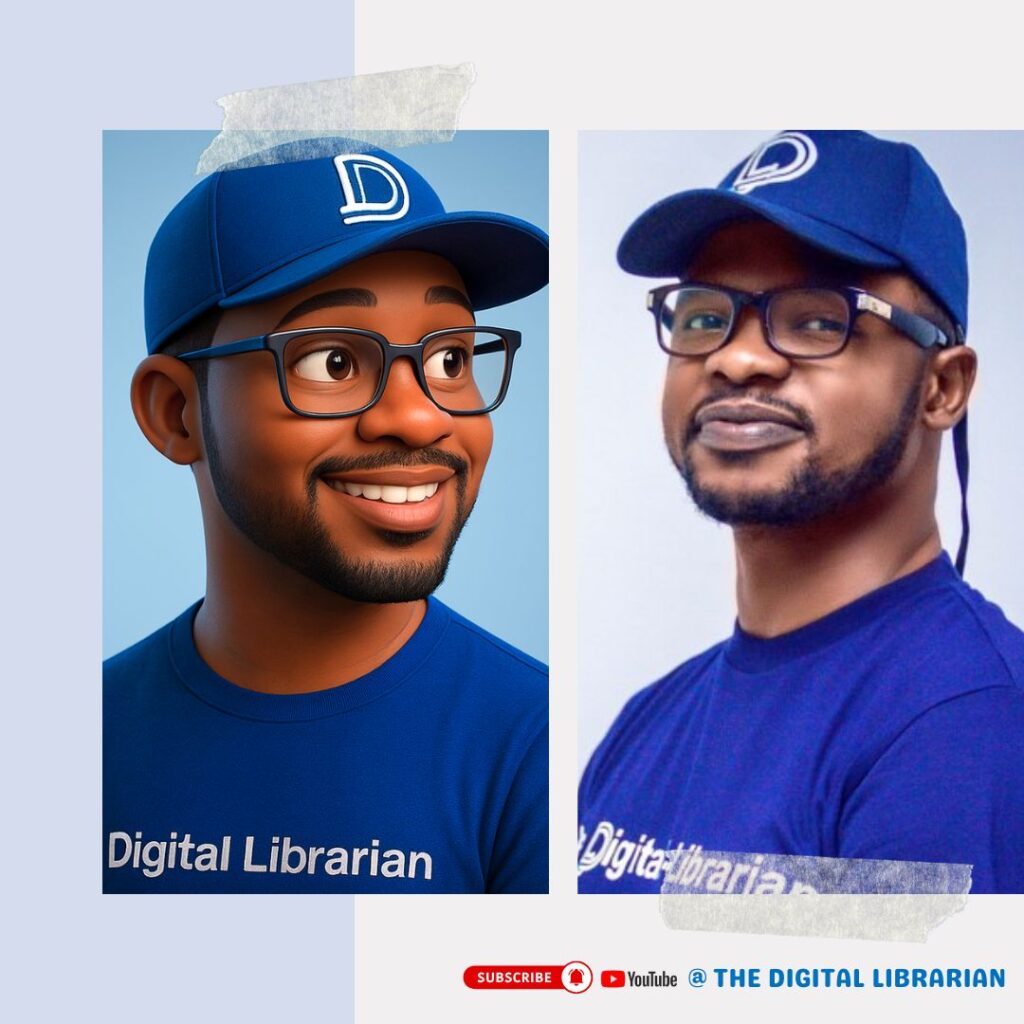
Five Prompt Styles you should Try out
Using these prompt ideas can help you generate creative images for profile pictures, storytelling, or content creation across different fields. The styles are universally relatable:
Studio Ghibli Style: This prompt style is inspired by the iconic Japanese animation studio behind movies like Spirited Away, Howl’s Moving Castle and the likes. You can try prompts like:
-
- Create an anime portrait in the style of Studio Ghibli, with warm lighting and expressive eyes.
- Turn this photo into a Studio Ghibli-style character with a magical forest background.
Pixar Animation Character Style: It’s known for its 3D animated look, big shiny eyes, and smooth textures. Try a prompt like:
-
- Turn this image into a Pixar-style animated character with a joyful expression and a colorful background.
LEGO Minifigure Version: They are blocky in nature, also have toy-like appearance and colourful too. Try this prompt:
-
- Reimagine this person as a LEGO minifigure standing in a LEGO city.
Simpsons-Style Character: This prompt transforms your image into a 2D cartoon style from the popular ‘The Simpsons TV series’. The Characters are usually with Yellow skin, bulging eyes, with over exaggerated expressions, looking really very funny in appearance. Prompt Example:
-
- Transform this image into a character from The Simpsons, with the classic yellow skin and cartoon vibe.
Disney Character Concept: This prompt style is inspired by popular princess/prince/fantasy characters we watch in movies like Frozen, Aladdin, etc. They are sort of fairytale-inspired portraits. Try a Prompt like:
-
- Turn this photo into a Disney princess-style character in a magical forest setting.
- Make me look like a Disney/Pixar character.
Some other Prompts to explore with
- Create a superhero cartoon version of this person, with a cape and glowing eyes.
- Turn this face into a comic book hero illustration.
- Turn this photo into a Renaissance-style oil painting.
What do you think about this latest update in ChatGPT?
Right now, OpenAI’s ChatGPT offers some very impressive features, from text, voice, and image generation to this new “Create Image” function, you enjoy them more on ChatGPT Plus, but the free option is honestly doing so much already.
But the big question is ‘How long will this last? Will OpenAI keep being generous as they have been since year 2022, or will they eventually switch to the model we’ve seen with other platforms, where you only get limited freemium access before the real features you are interested in gets locked behind a paywall?
Only time will tell. But while it lasts, don’t you think we should make the most of these tools ethically and create content that makes sense?
Don’t forget to share if this post helped you in any way!
Watch a Step by Step Video on How to Create your Cartoon or 3D Image on my Channel:
Your coach and friend,
Sylvester I. Ebhonu, CLN, amPAIDeF
Youtube Channel @ https://youtube.com/@thedigitallibr
FUPRE RECOGNISES SYLVESTER EBHONU’S COMMITMENT TO MENTORSHIP
Just last week (11th March, 2025), I had the privilege of speaking at the Federal University of Petroleum Resources (FUPRE) Alumni Career Training, organized by the Center for Career Services. The event aimed to equip graduates with basic career skills and strategies to thrive in today’s competitive job market. Few days after my presentation, at FUPRE’s 4th Convocation Ceremony, I was informed by one of the Chief Public Relations Officers of the institution – Mr. Isaac Ogbrah, that I had been presented an “Outstanding Career Mentorship Award.”
Being invited as Guest Speaker at FUPRE was already an honour. It was fulfilling for me, engaging with the brilliant minds in attendance, and their eagerness to learn justified the need for more of such programmes in Universities to bridge the gap between academia and workplaces. At the training, I shared my career metamorphosis model and other insights on leveraging digital tools, personal branding to survive today’s economy.
It’s remarkable to think that just two months ago, in January, I was also invited by the Dean of Student Affairs, Prof. (Mrs.) Chinelo A. Nwokolo, as a speaker at FUPRE’s 2024/2025 Orientation Programme for Freshers where I addressed students on the topic Responsible AI Usage in Undergraduate Studies. FUPRE’s commitment to promoting career readiness and digital literacy is truly commendable.
When I received the award, it was more than just a plaque; to me I saw a symbol of shared success and I am grateful to the Vice Chancellor Engr. Prof. Akpofureh Rim-Rukeh. This recognition is more than a personal milestone and I’d like to dedicate it to everyone out there who believes that people are gifts from God. THIS, is for all of us and THIS, is encouragement for us to keep UPSKILLING. Institutions like FUPRE, Admiralty Univerisity of Nigeria (ADUN) and few other institutions are setting the pace on what it means to prepare students for the evolving labour/job market. There is pressing need to consciously continue to put more effort in grooming employable graduates by integrating career-focused learning into our Nigerian educational system.
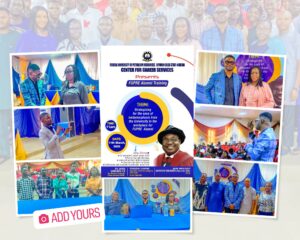
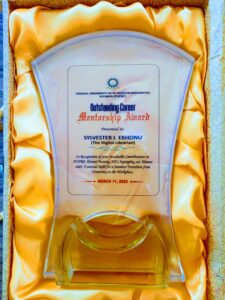
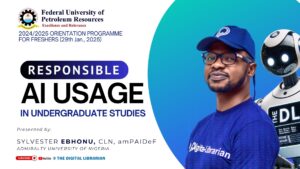
Here’s how I feel about this Award:
Once again, I extend my deepest appreciation to the management of FUPRE, (Mrs.) C.E. Ogwuche, the Ag. Director of the Centre for Career Services, Prof. (Mrs.) D.F. Ogeleka – Deputy Vice-Chancellor and everyone who has contributed to making these training sessions and award presented to me possible. Let’s keep pushing boundaries.
While looking forward to further engagements, collaborations, and opportunities to share knowledge that makes a great impact, if you missed my previous blog post on the FUPRE training, where you can access my slides and watch the video highlight, click here to check it out.
About Sylvester I. Ebhonu, CLN, amPAIDeF
Youtube Channel @ https://youtube.com/@thedigitallibr
From University to the Workplace: Key Lessons from FUPRE Alumni Career Training
The transition from university to the workplace is one of the most critical phases in any graduate’s life, requiring more than just a degree, but intentional preparation. To succeed in this metamorphosis from university to workplace, graduates need to be able to present their skills, leverage digital tools, and navigate or create job opportunities.
Understanding these challenges that fresh graduates face, the Center for Career Services, Federal University of Petroleum Resources (FUPRE), Delta State, organized a career training session as part of the activities leading up to the university’s 4th Convocation Ceremony. Themed ‘Strategizing for the Ease of Metamorphosis from the University to the Workplace’, this event was designed to equip alumni and final-year students with the necessary skills to navigate the job market successfully.
As the Guest Speaker, Sylvester I. Ebhonu, Head of Faculty and Satellite Campus Libraries at Admiralty University of Nigeria, Ibusa (one of the emerging Federal Universities in Nigeria), had the privilege of sharing insights on topic: ‘The Digital You: Crafting an Impressive CV and Online Presence’. Accompanied by a member of his team, Mr. Boluwatife Ojo, a TEDx Speaker and Business Developer, as well as a Corps Member at Admiralty University of Nigeria, they engaged the participants in an interactive and practical learning experience.
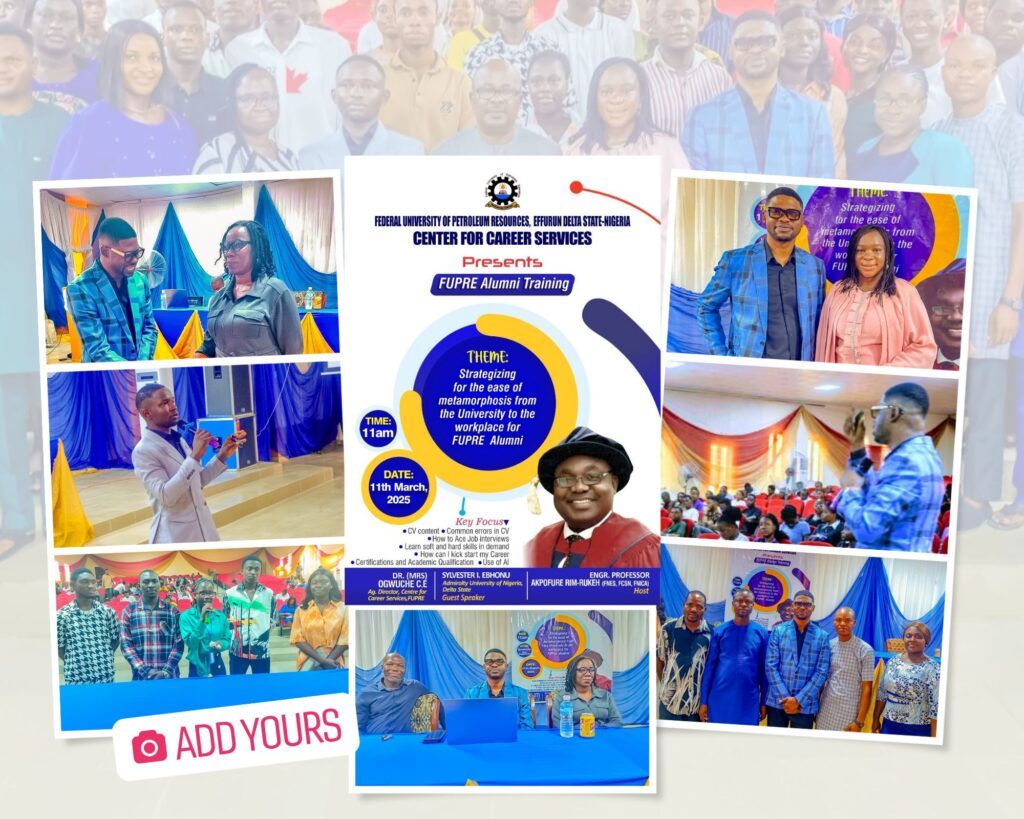
Training Activities and Lessons
The labour market today isn’t as it were in the past. Traditional job-hunting methods are no longer enough. Employers are increasingly looking for digitally literate candidates who have the potential to transform their businesses. According to the speakers, in today’s economy you do not necessarily even have to submit a CV before you get a gig, your digital footprint can speak for you. During the session, Mr. Ebhonu, also known as The Digital Librarian covered key strategies that can help young professionals stand out and secure better career opportunities, including:
- The importance of a strong digital footprint and personal branding
- Effective strategies for crafting compelling CVs and cover letters
- How to prepare for job interviews with confidence
- Practical AI and digital skills essential for career growth, etc.
A major highlight of the training was the Mock Interview Session, designed to provide participants with real-world interview exposure. The interview panel featured distinguished university officials, including:
One major highlight of the training was the Mock Interview Session conducted by the duo of Sylvester and Bolu, where selected participants were drilled on real-life interview scenarios. With senior university staff serving as panelists, students received constructive feedback on their interview skills, helping them refine their approach for future opportunities.
To further encourage excellence, top-performing participants were presented gifts and selected for guidance on how to gain scholarships to a premium professional certification course in business development.
Introducing the Career Metamorphosis Model
During his session, The Digital Librarian introduced his ‘Career Metamorphosis Model’, a concept inspired by his own experiences of continuous learning, reinvention, and impact. This model serves as a structured roadmap for young professionals looking to navigate their careers successfully. “It has the potential to help you develop adaptability, embrace lifelong learning, and strategically position yourself for career success”, he said.
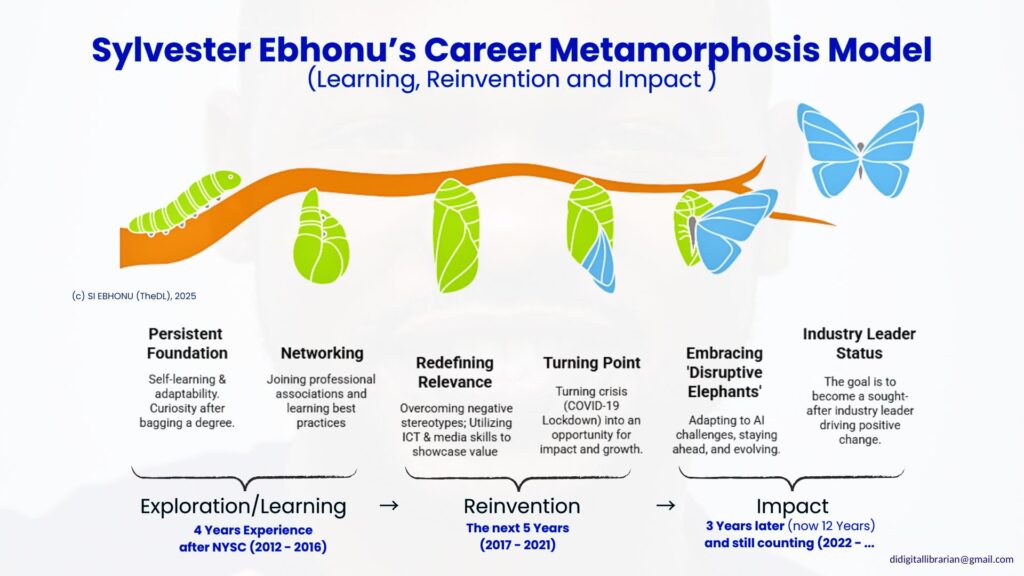
Appreciation & Acknowledgments
The Guest Speaker specially appreciates the Vice-Chancellor, Engr. Prof. Akpofure Rim-Rukeh, and the entire management of FUPRE for the opportunity to contribute to this impactful initiative. He is also grateful to Dr. (Mrs.) C.E. Ogwuche, the Ag. Director of the Centre for Career Services, for for organizing such a transformative training; to Prof. (Mrs.) D.F. Ogeleka – Deputy Vice-Chancellor for her devoting quality time to not just grace the occasion, but share some insightful tips with the participants on job interview preparation. Special appreciation also goes to senior members of staff who were present, including:
- Prof. Joachim Ukutsemuya – Director, Center for Entrepreneurship
- Prof. (Mrs.) Omosede Osafile – Director, Sub-Degree Programmes
- Dr. Elemike E.E. – Director, Sustainable Development
- Career Coaches from different departments, including Patrick Osaze
- A representative of the Counseling Unit, and many other distinguished guests.
While the Speaker look forward to seeing the impact this initiative will have on the careers of the participants, he congratulates the graduating class of FUPRE on their upcoming 4th Convocation Ceremony! This is a beginning and not an ending. The labour market is highly competitive, but with the right strategies and mindset, you can carve a niche for yourself and thrive.
Download a complete copy of the presentation here:
Watch Highlights of the Event and Subscribe to The Digital Librarian’s Youtube Channel here:
Librarian Spotlight Africa (LSA): The Journey So Far
Librarian Spotlight Africa (LSA): The Journey So Far (By Sylvester Ebhonu, Ramatu Haliru, Folasade Adepoju and Victoria Chukwuedozie)
As the curtains fall on the first season of Librarian Spotlight Africa (LSA), it’s time to reflect on a journey that has been nothing short of transformative. From February to December 2024, LSA has celebrated 11 honorees whose stories, achievements, and insights have reshaped the narrative of librarianship in Africa. What began as a vision to recognize and amplify the impact of African librarians gradually evolved into a movement, inspiring many and redefining librarianship and its role in the Society. In December 2024, LSA launched its pioneering Locate My Library Initiative, a project designed to enhance the visibility and accessibility of libraries across Africa.
As we wrap up the first Season of this programme, let us reflect on the journey so far:
February 2024: Prof. Yetunde Zaid – Pioneering Inclusiveness and AI
LSA’s maiden spotlight shone on Prof. Yetunde Zaid from Nigeria, she was celebrated for her groundbreaking integration of Artificial Intelligence (AI) in library operations at University of Lagos. Her commitment to inclusivity sets a new benchmark for libraries, emphasizing the importance of determination and focus in achieving professional milestones. She encouraged librarians to be focus and determine to achieve their set goals. Click to Watch the Complete Video
March 2024: Lbrn Pastor Dominic Omokaro – Transformative Leadership in Librarianship
In March, the programme gained some momentum as Lbrn (Dr, Pst) Dominic Omokaro, President and Chairman of Council of the Nigerian Library Association, was recognized for his visionary leadership. His tenure has seen innovative initiatives that have strengthened the association and advocated for issues affecting librarianship in Nigeria, positioning him as a transformative figure. His approach to leadership inspired viewers to rethink the role of Librarians in society. Click to Watch the Complete Video
April: Mr. Kepi Madumo – Safeguarding Cultural Heritage
In April, South Africa’s National Librarian, Mr. Kepi Madumo was honoured and he shared great insights on the importance of libraries as custodians of cultural heritage. His advocacy for social cohesion and preservation of South African cultural heritage through legal deposits showcased libraries as critical pillars of national identity and education and earned him this recognition. Click to Watch the Complete Video
May: Dr. Fatima Jibril Abduldayan – Advocating Open Access
Dr. Fatima Jibril Abduldayan was recognized as librarian of the month of May, 2024. Her outstanding work in community outreach and expertise in research data management and open science brought fresh perspectives to the field. Key take away from her session were advocacy for promotion and sustenance of open access to knowledge and information, be it online or physical format. She emphasized the importance of partnership with the press, and team work from local to international level. Her commitment to using data to solve real-world problems emphasized the evolving demands of the profession. Her story reinforced the importance of equipping librarians with skills that align with global trends. Click to Watch the Complete Video
June: Mr. Peter Balaba – Innovation in Community Libraries
June’s edition celebrated a librarian who redefined public library services in his community. From launching radio programs to providing digital literacy training, his work reflected truly, the innovative ways public libraries can remain relevant. Mr Peter Balaba’s work in Nakaseke, Uganda, was indeed inspiring. He equipped his community members with digital skills, collaborated with organisations like UNESCO, EIFL, and AfLIA to enhance the Nakaseke public library services and expanding their reach. Click to Watch the Complete Video
July: Naomi Ubogu – Transforming Libraries
In July, we turned the spotlight on an honoree whose career was dedicated to modernizing NGF Libraries. Her journey from setting up a library from scratch to implementing cutting-edge technologies served as an inspiring example of how librarians can drive organizational growth. Naomi Ubogu’s work in automating and digitizing the Nigeria Governors’ Forum Library made her a deserving honoree for this edition. Her journey reminds us that a deep passion for librarianship can lead to transformative change, both in personal careers and in the institutions we serve. Click to Watch the Complete Video
August: Mr. Mulugeta Woldetsadik – Social Impact through Libraries
Ethiopia’s Mulugeta Woldetsadik was celebrated for his impactful blogs and collaborations with international organizations advocating for library development. His efforts in enhancing school libraries and improving rural access to information through outreach programs have significantly impacted the Sidama region. His passion for libraries and literacy made him a natural fit for LSA. This edition exposed our viewers and followers to different ways that libraries and Librarians can create change. Click to Watch the Complete Video
September 2024: Dr. Sola Owolabi – Transformative Therapies in Libraries
In September, Dr. Sola Owolabi, a distinguished Nigerian librarian, lecturer, and expert in bibliotherapy and cinematherapy, known for leveraging these innovative therapies to address social challenges, particularly among adolescents and young adults was honoured. His mentorship in integrating modern technologies like AI into library management positioned him as a thought leader. His session encouraged viewers to think beyond just books and explore unconventional ways to use libraries as platforms for healing and social change. Click to Watch the Complete Video
October 2024: Paul Mensah – Driving Education Equity
While we initially planned to spotlight Paul Mensah a changemaker from Ghana, who couldn’t make it, the October edition took a surprising turn with the inclusion of Damilare Oyedele as a special guest. Damilare’s engagement highlighted the pressing challenges libraries face in Africa and commended LSA for its role in addressing these issues. His discussion brought valuable insights into the intersection of libraries and societal impact, reinforcing the relevance of LSA’s mission. Click to Watch the Complete Video
November: Dr. Nkem Osuigwe – Leadership in Open Access
November’s edition celebrated a trailblazer in open access and capacity building in Africa. The honoree’s initiatives, including mobilizing African librarians through the #1Lib1Ref campaign, have had a global impact. Dr. Nkem E. Osuigwe’s advocacy for open-source knowledge and mentorship through AfLIA reinforced the evolving role of librarians as active contributors to global narratives. Click to Watch the Complete Video
December: Hon. Sagir Musa Ahmed – A Librarian in Governance
The season concluded with Hon. Sagir Musa Ahmed, whose journey from librarian to Commissioner of Information highlighted the versatility of librarianship. The focus shifted to the essential qualities librarians must embody to thrive in their profession. His emphasis on digital literacy, cultural collaboration, the value of libraries and need for Librarians to advocate for their profession underscored the profession’s critical role in societal development. Click to Watch the Complete Video
Our Reflections and Prospects
This season has indeed been a very remarkable journey, but more importantly, it was a learning experience. Africa’s linguistic diversity presented some challenges, especially in cases where honorees were not fluent in English, affecting communication. Also, our efforts to spotlight librarians from Francophone countries were unsuccessful, likely due to this language barrier, which firms up the need for more inclusive engagement strategies in future editions. Technical glitches during live streams reminded us of the importance of robust planning, reliable internet and streaming gacilities. Despite these hurdles, the programme continued to adapt and improve.
While our YouTube, Facebook and LinkedIn audience engagement metrics indicate growing interest, the impact of LSA is also seen in the testimonials and feedback from our honorees and viewers. Many have shared how the programme has inspired them to approach their work differently. While we continue to refine our impact assessment strategies, Season Two promises to be even more impactful to the global library community. With plans to include more African countries, collaborate with international organizations, and launch initiatives, LSA is poised to make a greater impact. We’re also looking forward to explore partnerships to fund and expand the programme, ensuring its sustainability and reach. If you’d like to volunteer and contribute your skills to this growing initiative, we’d love to have you on board. Volunteer here!
Join Us in Shaping the Future of Librarianship!
As we close this remarkable first season of Librarian Spotlight Africa, your feedback is very important in helping us grow and achieve our mission of redefining librarianship across Africa. Please take a moment to complete our Feedback / Impact Survey.
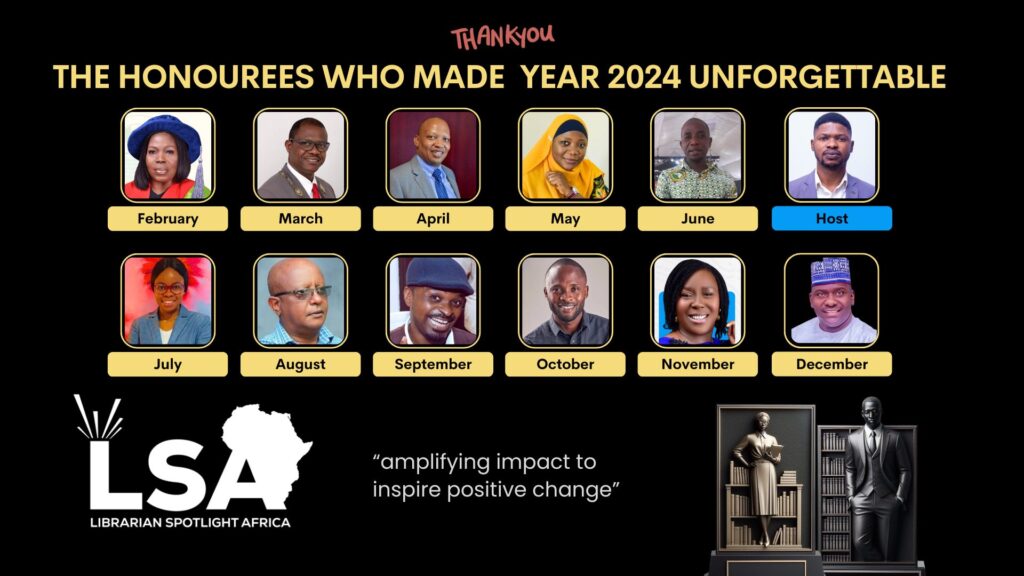
We extend our heartfelt thanks to our honorees, viewers, and team members for making Season One (2024) a success. Your support helped us bring this vision to life. As we prepare for Season Two, which commences in February, do you know an outstanding librarian or changemaker who embodies innovation, leadership, and dedication to advancing libraries in Africa? Nominate them here for the upcoming season! Share our videos, and support our initiatives. Together, let’s continue to share/amplify the impact of librarianship across Africa.
Explore More: Access the full playlist of Season 2024 episodes:
February 2024: Prof. Yetunde Zaid
March 2024: Pastor Dominic Omokaro
May 2024: Dr. Fatima Jibril Abduldayan
August 2024: Mr. Mulugeta Woldetsadik
September 2024: Dr. Sola Owolabi
Bobrisky be shaking tables
So there’s this hot topic buzzing social media right now… You know how VeryDarkMan (VDM) has been on Bobrisky’s case lately, right? Plus, with Gistlover blog dropping those names of “gabriellas” recently, there’s been quite a stir about gender identity and social influence in Nigeria. Facebook and Twitter no dey calm at all! 😅
Looking forward to an upcoming, not so regular academic topic if you ask me: “Being Bobrisky Symposium: Agency, Subjectivity, and Politics” organized by The LSA African Studies Center at the University of Michigan and the University of Kansas, scheduled to hold via Zoom on 2nd of November 2024. That would be something else right? And here’s what got me writing: will VDM show up? 👀 See details of the announcement on Optimistic Scholar Blog,.
Let’s be real though, this is actually beyond Bobrisky. It’s more about how Nigeria is changing, how we’re having conversations we never used to have before. Whether we like it or not, Bobrisky has become a symbol of defiance against gender norms in Nigeria. Scholars are now gathering to discuss the complexities of agency and subjectivity and this I think will not just be the usual academic big grammars gathering, who knows, next will be project/dissertation topics about the influence of people like Bobrisky to society. A symposium like this can help us understand how influential celebrities like Bobrisky and the likes use their platforms to challenge societal expectations and advocate for the LGBTQ+ community in Nigeria. These kind of conversations can actually help build a more inclusive Nigeria, redefine self-expression and prepare us for the future.
If you’re interested in the conversation, not the drama… Just Register to participate
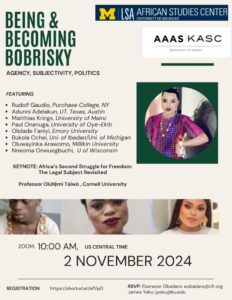
NLA IT SECTION HOLDS 18TH ANNUAL LITT WORKSHOP/CONFERENCE AT UNIABUJA
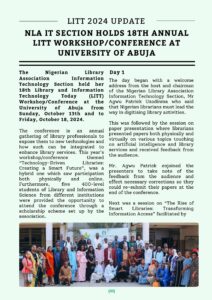
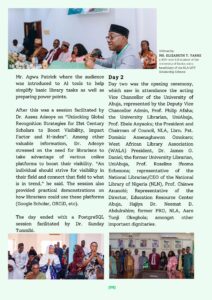
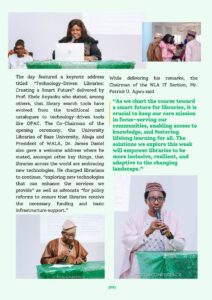
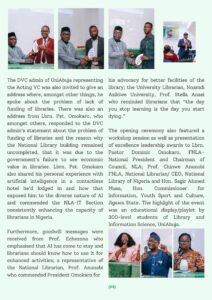
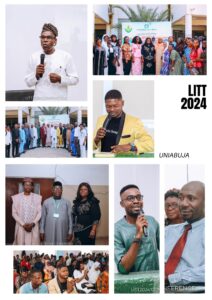
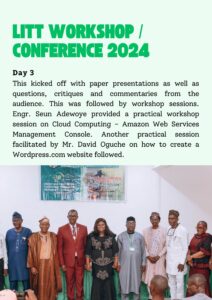
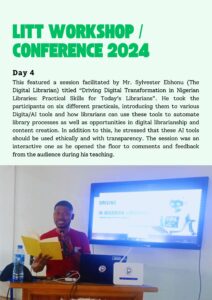
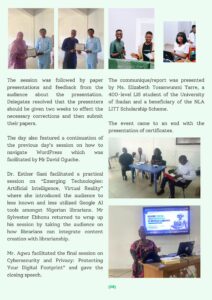
The Nigerian Library Association Information Technology Section held her 18th Library and Information Technology Today (LITT) Workshop/Conference at the University of Abuja from Sunday, October 13th and to Friday, October 18, 2024. The conference is an annual gathering of library professionals to expose them to new technologies and how such can be integrated to enhance library services. This year’s workshop/conference themed “Technology-Driven Libraries: Creating a Smart Future”, was a hybrid one which saw participation both physically and online. Furthermore, five 400-level students of Library and Information Science from different institutions were provided the opportunity to attend the conference through a scholarship scheme set up by the association.
Highlights of Each Day of the Conference/Workshop:
Day One
The day began with a welcome address from the host and chairman of the Nigerian Library Association Information Technology Section, Mr Agwu Patrick Uzodinma who said that Nigerian librarians must lead the way in digitising library activities.
This was followed by the session on paper presentation where librarians presented papers both physically and virtually on various topics touching on artificial intelligence and library services and received feedback from the audience.
Mr. Agwu Patrick enjoined the presenters to take note of the feedback from the audience and effect necessary corrections so they could re-submit their papers at the end of the conference.
Next was a session on “The Rise of Smart Libraries: Transforming Information Access” facilitated by Mr. Agwu Patrick where the audience was introduced to AI tools to help simplify basic library tasks as well as preparing power points.
After this was a session facilitated by Dr. Azeez Adeoye on “Unlocking Global Recognition Strategies for 21st Century Scholars to Boost Visibility, Impact Factor and H-index”. Among other valuable information, Dr. Adeoye stressed on the need for librarians to take advantage of various online platforms to boost their visibility. “An individual should strive for visibility in their field and connect that field to what is in trend,” he said. The session also provided practical demonstrations on how librarians could use these platforms (Google Scholar, ORCiD, etc).
The day ended with a PostgreSQL session facilitated by Dr. Sunday Tunmibi.
Day Two
Day two was the opening ceremony, which saw in attendance the acting Vice Chancellor of the University of Abuja, represented by the Deputy Vice Chancellor Admin, Prof. Philip Afaha; the University Librarian, UniAbuja, Prof. Ebele Anyaoku; the President and Chairman of Council, NLA, Lbrn. Pst. Dominic Amenaghawon Omokaro; West African Library Association (WALA) President, Dr. James O. Daniel; the former University Librarian, UniAbuja, Prof. Roseline Ifeoma Echezona; representative of the National Librarian/CEO of the National Library of Nigeria (NLN), Prof. Chinwe Anunobi; Representative of the Director, Education Resource Center Abuja, Hajiya Dr. Neemat D. Abdulrahim; former PRO, NLA, Aare Tunji Okegbola; amongst other important dignitaries.
The day featured a keynote address titled “Technology-Driven Libraries: Creating a Smart Future” delivered by Prof. Ebele Anyaoku who stated, among others, that library search tools have evolved from the traditional card catalogues to technology-driven tools like OPAC. The Co-Chairman of the opening ceremony, the University Librarian of Baze University, Abuja and President of WALA, Dr. James Daniel also gave a welcome address where he stated, amongst other key things, that libraries across the world are embracing new technologies. He charged librarians to continue, “exploring new technologies that can enhance the services we provide” as well as advocate “for policy reforms to ensure that libraries receive the necessary funding and basic infrastructure support.”
While delivering his remarks, the Chairman of the NLA IT Section, Mr. Patrick U. Agwu said “As we chart the course toward a smart future for libraries, it is crucial to keep our core mission in focus—serving our communities, enabling access to knowledge, and fostering lifelong learning for all. The solutions we explore this week will empower libraries to be more inclusive, resilient, and adaptive to the changing landscape.”
The DVC admin of UniAbuja representing the Acting VC was also invited to give an address where, amongst other things, he spoke about the problem of lack of funding of libraries. There was also an address from Lbrn. Pst. Omokaro, who amongst others, responded to the DVC admin’s statement about the problem of funding of libraries and the reason why the National Library building remained uncompleted, that it was due to the government’s failure to see economic value in libraries. Lbrn. Pst. Omokaro also shared his personal experience with artificial intelligence in a contactless hotel he’d lodged in and how that exposed him to the diverse nature of AI and commended the NLA-IT Section consistently enhancing the capacity of librarians in Nigeria. Furthermore, goodwill messages were received from Prof. Echezona who emphasised that AI has come to stay and librarians should know how to use it for enhanced activities; a representative of the National Librarian, Prof. Anunobi who commended President Omokaro for his advocacy for better facilities of the library; the University Librarian, Nnamdi Azikiwe University, Prof. Stella Anasi who reminded librarians that “the day you stop learning is the day you start dying.”
The opening ceremony also featured a workshop session as well as presentation of excellence leadership awards to Lbrn. Pastor Dominic Omokaro, FNLA- National President and Chairman of Council, NLA; Prof. Chinwe Anunobi FNLA, National Librarian/ CEO, National Library of Nigeria and Hon. Sagir Ahmed Musa, Hon. Commissioner for Information, Youth Sport and Culture, Jigawa State. The highlight of the event was an educational display/playlet by 300-level students of Library and Information Science, UniAbuja.
Day Three
This kicked off with paper presentations as well as questions, critiques and commentaries from the audience. This was followed by workshop sessions. Engr. Seun Adewoye provided a practical workshop session on Cloud Computing – Amazon Web Services Management Console. Another practical session facilitated by Mr. David Oguche on how to create a WordPress.com website followed.
Day Four
This featured a session facilitated by Mr. Sylvester Ebhonu (The Digital Librarian) titled “Driving Digital Transformation in Nigerian Libraries: Practical Skills for Today’s Librarians”. He took the participants on six different practicals, introducing them to various Digita/AI tools and how librarians can use these tools to automate library processes as well as opportunities in digital librarianship and content creation. In addition to this, he stressed that these AI tools should be used ethically and with transparency. The session was an interactive one as he opened the floor to comments and feedback from the audience during his teaching.
The session was followed by paper presentations and feedback from the audience about the presentation. Delegates resolved that the presenters should be given two weeks to effect the necessary corrections and then submit their papers.
The day also featured a continuation of the previous day’s session on how to navigate WordPress which was facilitated by Mr David Oguche.
Dr. Esther Gani facilitated a practical session on “Emerging Technologies: Artificial Intelligence, Virtual Reality” where she introduced the audience to less known and less utilized Google AI tools amongst Nigerian librarians. Mr Sylvester Ebhonu returned to wrap up his session by taking the audience on how librarians can integrate content creation with librarianship.
Mr. Agwu facilitated the final session on Cybersecurity and Privacy: Protecting Your Digital Footprint” and gave the closing speech.
The communique/report was presented by Ms. Elizabeth Tosanwunmi Tarre, a 400-level LIS student of the University of Ibadan and a beneficiary of the NLA LITT Scholarship Scheme.
The event came to an end with the presentation of certificates.
Demystifying Open Access: Join our Free Webinar for International Open Access Week 2024
Demystifying Open Access: Join Our Free Webinar for International Open Access Week 2024
The concept of Open Access seem common, simple, and even impacting the scholarly world in a very significant way, but it is still misunderstood by many. This should actually be a great concern not just for librarians, but scholars from all disciplines, government and other stakeholders. Open Access helps to make researchers’ outputs free and available to the public without any barriers for purpose of greater academic collaboration. The International Open Access Week is a rare opportunity to demystify open access and explore the future of scholarly publishing.
This year’s theme tagged: “Community Over Commercialisation,” will enable us look at how possible it is for us to prioritize community-driven initiatives over profit and creating equal access to knowledge. So, whether you’re a lecturer, researcher or librarian, or just someone passionate about the future of knowledge sharing, this is the conversation you need to be part of!
The Digital Librarian, the Upskill and Connect Village, Sarah Yop Gyang, Libsense Open Science Nigeria and Dr. Azeez A. Adeoye (experts in the area) are excited to host a free webinar to mark this global event. The webinar will feature two key presentations, then followed by an engaging panel discussion.
Date: Saturday 26th October, 2024
Time: 1:00pm (Nigerian Time)
You can participate in this webinar through any of the following platforms:
YouTube || Facebook || LinkedIn
Why should you join this webinar?
- You’ll gain insights from the presentations on open access, ethics and community-oriented knowledge sharing.
- The panel will feature open access advocates who will discuss the balance between community priorities and commercial interests.
- We will also be making a major announcement during the event. Content, which we’re previously closed/paid-for will now be freely accessible for professional growth in librarianship.
- We also plan to hold a live voting session where participants can vote on whether Nigerian academic institutions should fully embrace open access.
- Participation is free and open to everyone! Join the Upskill and Connect Village now
WATCH ON YOUTUBE NOW!
This is another opportunity to learn more about open access and be a part of the conversations that will shape the future of scholarly publishing.
SPREAD THE WORD!
Click here to learn more about the Upskill and Connect Village
Sylvester I Ebhonu (TheDL)
NLA President Receives Honorary Doctorate and Humanitarian Recognition
NLA President Receives Honorary Doctorate and Humanitarian Recognition
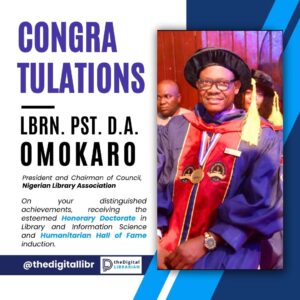
Over the weekend (on Saturday, 19th October 2024) at the University of Lagos, Akoka – Lagos State, the NLA witnessed another milestone achievement, as Lbrn Pastor Dominic Amenaghawon Omokaro (President and Chairman of Council of the Nigerian Library Association (NLA)) was conferred with an Honorary Doctorate Degree in Library and Information Science and got inducted into the Integrity Fellow Humanitarian Ambassador Hall of Fame Class of 2024 by the Anointed University Worldwide, Johannesburg, South Africa.
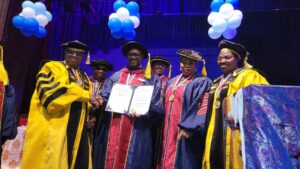
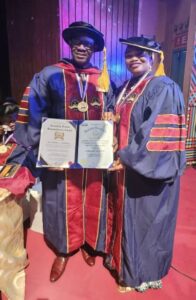
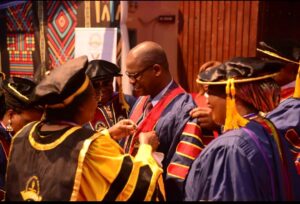 Dr. Hajiya Neemat D. Abdulrahim, a member of Council of the University, while reading the President’s citation, described the NLA President as “a man with Fragrance of Integrity.” Many people who have worked with him would agree with this.
Dr. Hajiya Neemat D. Abdulrahim, a member of Council of the University, while reading the President’s citation, described the NLA President as “a man with Fragrance of Integrity.” Many people who have worked with him would agree with this.
Congratulations to our dear President on these well-deserved honours!
Feel free to share a word of congratulations for our own!
SING YOUR PROFESSION and WEAR YOUR PROFESSION!!!
https://thedigital-librarian.com/product/wear-your-profession-with-pride/

